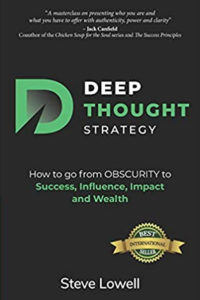
One issue many entrepreneurs don’t realize they have is they get swept away into thinking big before they’re ready. But thinking big alone does not adequately prepare you for the bigger game. In his book, Deep Thought Strategy, Steve Lowell explains how you need to change the way you think about your market. Steve is an award-winning global speaker and #1 international bestselling author. For sales professionals and entrepreneurs who are fed up with thinking big but playing smaller than they know they could, this episode is for you.
—
Listen to the podcast here
Deep Thought Strategy With Steve Lowell
I’m very excited to introduce our next guest, Steve Lowell. He has been speaking and performing on the live stage since he has been six years old. Steve is originally from Ottawa, Canada. He is an award-winning global speaker. For many years, he has been training and mentoring executives, thought leaders, and professional speakers around the world to deliver high-impact keynote speeches, drive revenue from their platform and build wealth through speaking. We all want to do that.
You are the President of the Global Speakers Federation and the past President of the Canadian Association of Professional Speakers. You are a three-time number one international bestselling author. You are a sought-after expert helping thought leaders and sales teams sell more by changing the way they speak. We are going to be talking about your book called Deep Thought Strategy: How to go from OBSCURITY to Success, Influence, Impact, and Wealth. Steve, thank you so much for being here.
It’s my privilege. Thank you for asking.
I love to get started with the following question. Why did you write a book?
It’s because people were asking me to. Deep Thought Strategy is my third book. I don’t enjoy writing books but back in 2010, people kept asking me where is my book about all of the speaking stuff that I was doing because a lot of my content is unique. I wrote a book back then called From Stage Fright to Spotlight and then I thought, “Good, I have written the book.” I was working with so many authors. I thought, “I should probably be one.” I came up with this concept over the years called Deep Thought Strategy. I was teaching this concept to clients and they started asking, “Where is the book?” I said to myself, “I’m going to have to write the book.”
You don’t have to be different from anybody else who does what you do to stand out. You only have to appear to be different.
I tried writing this book about fifteen times. I even hired ghostwriters to write the book for me but they couldn’t get what was in here out onto the page and it was getting frustrating. What happened was my wife Jayne and I said, “We are going to go up to a cottage. We are going to go into the middle of the woods where there’s nothing and nobody. We are going to hibernate there in November. We are going to write the book.” We did that. I went up and wrote the book. We published it. I wrote the book because people were asking for it and I couldn’t think of a better reason than that.
That’s a great reason to write a book. When people are asking for it, I always tell my clients, “Your book is your first product. Everyone in the world can buy a copy of your book but not everyone in the world can buy an hour of your time.” People were requesting the books. That’s fantastic. Thank you for sharing that backstory. I would love for you to share some of your life and leadership secrets that you share in your book.
Deep Thought Strategy is about this concept that I teach speakers, coaches, and entrepreneurs. The concept is, “You don’t have to be different from anybody else who does what you do to stand out.” You hear a lot of marketing and branding people, and they will talk about differentiation, “You have to be different. You’ve got to have something unique and stand out.” I don’t disagree with those principles, except there are so many speakers, coaches, authors, consultants, trainers, experts, and thought leaders who do something that has an enormous amount of competition in their field.
One of the principles I have learned is, “You don’t have to be different from anybody else who does what you do to stand out. You only have to appear to be different.” This is a concept that I have been teaching people and speakers for years. All you have to do is appear to be different. Deep Thought Strategy was about, “How do you actually do that? How do you appear to be different from everybody else who does what you do?” That’s life lesson number one.
Life lesson number two is about changing the way you think about your business. Many people will do this. This is the standard way people think about their businesses, “My market has a problem and I have a solution. I’m going to bring this solution to the market and solve the problem.” There’s nothing wrong with that approach except for the fact that that’s what all your competitors are doing. They are doing the exact same thing. That’s the way they think, “There’s a problem. I have a solution. All I need to do is take this solution, match it with the problem and we have got some business.”
The problem with that approach and type of thinking is that you are thinking the same way as your competitors. I always thought about it this way, “They have a problem but if I bring a solution to the problem that they are already aware of, all I’m doing is standing in line with another solution.” If my prospect has a problem and I go and say, “I have got my 4 pillars to this, 6 secrets to that or 5 strategies,” my competitors are all doing the same thing.” I’m standing in line waiting for them to select one.

My philosophy has always been, “Bring their awareness to a problem they never knew they had, and then provide a solution to that problem.” It’s more about educating the prospect and bringing their awareness to a problem that they never even knew existed so they go, “No wonder I have this other problem because I have this problem that I never knew about.” We provide a solution to that. Deep Thought Strategy is about changing the way you think about your market.
The third life lesson is about changing the way you speak about yourself and your market. The way that most people in business speak about themselves or their business is they say, “You have a problem. I have a solution. I can solve the solution for you.” They present, speak and show up that way. All they are doing is standing in line behind everybody else who speaks that way. What Deep Thought Strategy does is change the way that you speak about yourself and your business so that you are no longer speaking about the client’s problem and your solution.
What you are doing is you are speaking from the standpoint of education. You are helping the client become aware of things that they never considered before. It’s about demonstrating your unique understanding of your market’s condition from a perspective they have never considered before. If there were these three principles, the first one is you don’t have to be different. You only have to appear to be different. The second one is you want to change the way you think about your market. The third is you want to change the way you speak about yourself and your expertise. Those are the three lessons.
Those are powerful lessons that you shared because what it shows is that you are listening to the person. Instead of coming up with your solution and trying to fit a square peg into whatever their problem is, what you are doing is you are listening and it’s more of a discovery conversation. Listening is important. Those are fantastic strategies. By showing people these deep thought strategies, what changes have you seen in some of your clients and colleagues who have applied this strategy?
There have been many. I will give you an example. There’s a guy I work with. He has popped into my head because he is out of Toronto. His name is Ben. Ben has a philosophy, program or system that he calls Neuroscaping. He works with big event organizers like big multimillion-dollar events. His expertise is about making sure that every single thing in the event, from the lighting, music, seating, to everything, is all in line with the neurotopography of the brain. Everything is neuroscape but him, trying to explain that to people was difficult.
They couldn’t get it because he is so far into the details and always technical. He is always talking about all the stuff that juices him, the technology behind it, and the science. People’s eyes were glazing over. One of the things that Deep Thought Strategy did for him is to help simplify it down to a point where we taught him to think differently about his market, “What is it that they need to understand that causes the problems that they have?” We were able to simplify the problem. We taught him how to get on a platform and present it to speak differently to speak at their level.
He goes to all of these conferences all over the world. He presents Neuroscaping and people go, “Now, I get it.” They hire them for the big bucks. That’s one of many. The overall change that happens with Deep Thought Strategy is you can stand in front of any audience, whether it’s virtual, live or an audience of 1,000 or 1. Maybe it’s on a podcast, video or whatever. You can make yourself appear to be different simply by sounding different than everybody else who does what you do, even if you are not profoundly different from everybody else who does what you do.
I will give you a simple example. When I speak live, I always ask this question to the audience, “Put up your hand if you or somebody you know is in the market for a tennis instructor.” I put my hand up. In an audience of maybe 100 people, usually, there’s nobody. Maybe once in a blue moon, one hand might go up. I have done this all over the world. Let’s say there’s an audience of 100 people. I say to the audience, “Look around. Nobody has got their hands up because nobody is in the market for a tennis instructor. I’m going to guess that at least 30 of you are in the market for a tennis instructor now or you know somebody who is.”
Educate your prospect and bring awareness to a problem they never knew existed and then provide a solution to that.
I tell them about this guy named Brian, who came to me many years ago. He said, “Steve, I’m going to all the networking events, shaking all the hands and making all the calls. I’m not getting the business I need.” I said, “Brian, what do you do?” He said, “I’m a tennis instructor.” We see what the market is for tennis instructors. We taught Brian these principles that I teach in Deep Thought Strategy. If you saw Brian now and if you said, “Brian, what do you do?”
He would say something like this, “You know how sometimes kids have so much energy. They are bouncing off the walls. The parents get frustrated because they have no idea what to do with these kids. What I do is I bring kids of any age on a tennis court. I absolutely exhaust them and hand them back to their parents.” I asked the audience, “Put up your hand if you know somebody who might be in the market for a tennis instructor.” Everybody’s hands go up.
That’s not an example of a Deep Thought Strategy. It’s an example of by changing the way you understand your market and speak about your services means the difference between, “I’m not interested and, “Tell me more.” That’s an example of what Deep Thought Strategy does. It takes your market, audience or prospect from, “I’m not interested,” to, “Tell me more” by making you appear to be different from everybody else who does what you do.
It was a great story to exemplify this strategy at work. With that, I would like to jump into our speed round. This is where I’m going to ask you questions and you are going to say the first thing that comes to mind. What is going to be your legacy, Steve?
My legacy is going to be my daughter.
What is your favorite book?
See You at the Top by Zig Ziglar is the first book I ever read from cover to cover.
Who is your favorite author?
My favorite author is Zig Ziglar.
What are you reading next?

Now, I’m not reading anything. I’m between books. I usually have 3 or 4 books on the go and I know this is rapid-fire. One of my favorites is Never Split the Difference by Chris Voss.
What are you writing next? What is your next book?
My next book is going to be something around the Perfect Sales System. That will not be the title of it but it’s based on a sales process that I have developed that’s becoming pretty popular.
We have our audience at home. I would love for you to share. What is one final piece of advice from your book that you want to share with our audience to leave them?
The one final piece of advice is this, “Detach from that which you think you know.” You see so many people think that they have it right and are not open to considering, “Maybe I need to look at a different approach to stand out.” Detach from that which you think you already know and be open to an alternate approach. It’s not just with what we are talking about but with everything because so many times, you will find an alternate approach and go, “I never even considered that before.” That’s the most important thing that’s going to help you grow in any endeavor. That is to detach from that which you think you already know and be open to a new perspective.
That’s sage advice. It’s the great unlearning, which we all get to do every day of our life. As we get older, we get to unlearn more. Steve, I wanted to thank you for being on the show. Where can people find out more about you? Please share your websites and social media links.
Go to my website at SteveLowell.com. It’s all there.
You will be able to find all his books and his social media and where you can connect with Steve next. Thank you so much, Steve. It’s wonderful to have you.
It was great to be here. I want to congratulate you on the enormity of your success and the work that you are doing. I love the work that you are doing. You are impacting lives and helping people. You have got great content.
I appreciate that, Steve. Thank you, everyone, for reading another episode of the show. See you next time.
Important Links:
- Steve Lowell
- Global Speakers Federation
- Deep Thought Strategy: How to go from OBSCURITY to Success, Influence, Impact, and Wealth
- From Stage Fright to Spotlight
- Neuroscaping
- See You at the Top
- Never Split the Difference
- Perfect Sales System
About Steve Lowell
 Is this you?
Is this you?
You’re a thought leader or an entrepreneur with a great idea you know could transform your client’s world; maybe even set the standard for an entire industry.
You have developed it, mastered the skills and created a business around your idea, but you have hit a plateau. You just can’t seem to get the market to understand your idea and they don’t see the value it offers.
When you try to explain it or sell it, your prospects get lost in the details. Their eyes glaze over, they tell you how awesome it is, but they don’t buy. They just don’t seem to get it!
I’m the guy who teaches you how to craft and present the message so they get it, and then teaches you a perfect sales system so they buy it
